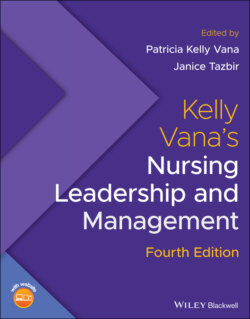Читать книгу Kelly Vana's Nursing Leadership and Management - Группа авторов - Страница 51
Emotional Intelligence
ОглавлениеEmotional intelligence is a component of leadership and refers to the capacity to accurately perceive and express emotion, to use feelings to inform and guide thinking, to understand the meanings of emotions and to manage emotions for personal and social growth (Goleman, 1998). Emotional intelligence consists of social and emotional skills enabling the capacity to interact with understanding and respect, resolve conflicts, withstand stress and adversity to persevere. Better performance and job success have been attributed to emotional intelligence, whereas problems with interpersonal relationships and difficulty adapting occur when emotional intelligence is low or absent. Emotional intelligence is necessary for nurses to maintain a calm and professional demeanor in emergency situations, to participate effectively in teams and groups and to navigate interpersonal issues and adversity.
Emotional intelligence includes five basic emotional and social competencies: i.e., Self‐awareness, Self‐regulation, Motivation, Empathy, and Social skills (Table 1.3).
Table 1.3 Emotional Intelligence (EI)
| Emotional and social competencies | Examples for a beginning nurse leader | |
|---|---|---|
| Self‐awareness | Knowing what you are feeling in the moment and using your preferences to guide your decision making; having a realistic assessment of your own abilities and a well‐grounded sense of self‐confidence | Recognizing fatigue and feeling a bit drained after admitting a new patient and getting another patient off to surgery; rather than skipping a break, thinking that the break time will help with catching up, the EI nurse uses self‐awareness to decide it would be best to take the break. She checks in with the charge nurse and then hands‐off assigned patients and uses the time to rest and refresh. |
| Self‐regulation | Handling your emotions so that they facilitate rather than interfere with the task at hand; being conscientious and delaying gratification to pursue goals; and recovering well from emotional distress | Discovering that a medication error has occurred can create emotional distress ranging from fear of what peers will think, fears that you did something that might have caused patient harm, to feeling less than adequate as a nurse. The EI nurse will manage those emotions in the moment to focus on reporting the error, examining how it happened, and being open to learning and taking action to prevent a future occurrence. |
| Motivation | Using your deepest preferences to move and guide you toward your goals, to help you take initiative and strive to improve, and to persevere in the face of setbacks and frustrations | A goal for a new nurse is to pursue becoming board certified in a selected area of nursing. For example, the certification for critical care nurses is the Critical Care Registered Nurse (CCRN); for oncology nurses, the certification is Oncology Certified Nurse (OCN). After completing a review course and taking the certification exam, a nurse receives results that show she didn't pass the exam. At first, she is embarrassed and feels that she isn't smart enough. As an EI nurse, she realizes that this setback isn't going to prevent her from reaching her goals. She also takes initiative and asks for help to guide her preparation to retake the exam in the future. |
| Empathy | Sensing what people are feeling; being able to take their perspective; cultivating rapport and being in tune with a broad diversity of people | As the nurse walks into the patient's room planning to change the patient's dressing, the patient begins to cry. The EI nurse realizes that the patient's emotional distress is a priority and she takes time to comfort the patient and acknowledge the patient's need to express her feelings. |
| Social Skills | Handling emotions in relationships well and accurately reading social situations and networks; interacting smoothly; using these social skills to persuade, lead, negotiate, and settle disputes, and for cooperation and teamwork | Interacting smoothly at change of shift can require the EI nurse to recognize when the situation with a peer is not going well. It's important to not take it personally but rather to acknowledge if another's expectations were not met. Then say what you can/will do and explore what you need to do for continued teamwork. |
